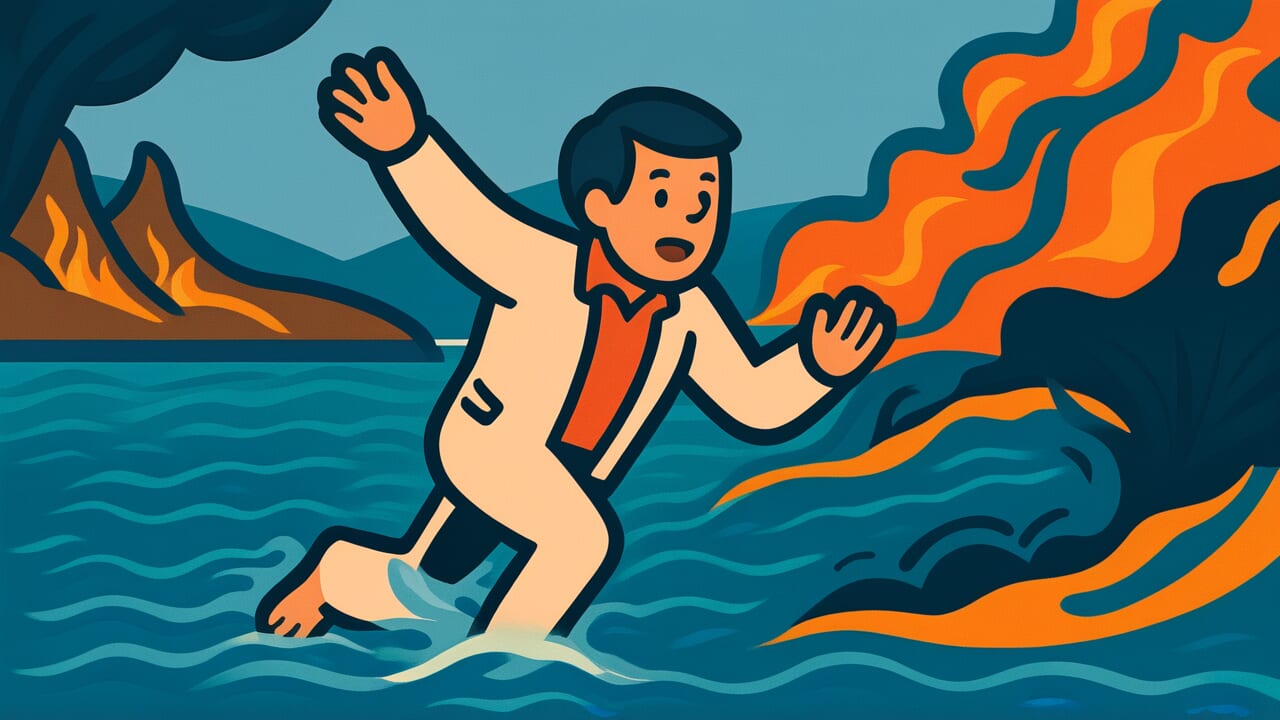How to Read “Avoiding fire only to fall into water”
Hi wo sakete mizu ni ochiiru
Meaning of “Avoiding fire only to fall into water”
“Avoiding fire only to fall into water” means trying to escape one disaster only to end up in an even worse situation.
It describes what happens when you focus so desperately on avoiding immediate danger that you fail to notice an even more serious threat ahead.
You end up in a worse situation than where you started.
This proverb applies when someone loses the ability to see the bigger picture while solving a problem right in front of them.
For example, someone might take out a new loan to pay off existing debt, only to fall into multiple debts.
Or someone might try to hide a small mistake and end up committing serious fraud.
This saying warns us about a typical pattern of human error. When we act in panic, we often create problems more serious than the original one.
Origin and Etymology
The exact origin of this proverb is unclear. However, its structure shows it combines two contrasting disasters: fire and water.
Fire and water have always been the most familiar yet most terrifying symbols of natural disaster for humans.
In Japan, there’s a saying that “fires and fights are the flowers of Edo.” This shows how fire was the greatest threat, especially in cities.
Meanwhile, as an island nation, Japan has always lived alongside the dangers of floods and drowning.
These two disasters represented fears deeply rooted in people’s daily lives.
This proverb was likely influenced by Chinese idioms. China has a similar expression: “Refuse a tiger at the front gate, and a wolf enters through the back.”
It describes avoiding one danger only to fall into another. In Japan, this became “fire” and “water” – more familiar and understandable disasters.
The image is vivid: someone desperately running from fire, only to find a river or pond waiting unexpectedly ahead.
This perfectly symbolizes life’s irony. Behind this saying lies deep insight into the difficulty of human judgment and the unpredictability of fate.
Usage Examples
- I borrowed from a consumer finance company because my credit card payments were too much. It was truly avoiding fire only to fall into water – my repayment amount doubled.
- I made a false report to escape my boss’s scolding. It became avoiding fire only to fall into water, and I lost my credibility too.
Universal Wisdom
“Avoiding fire only to fall into water” reveals the danger of our instinctive reactions when facing crisis.
When we sense an immediate threat, we lose our calm judgment. We become controlled by the impulse to “escape this moment right now.”
This psychology is our survival instinct, built into humans since ancient times.
What’s interesting is that this proverb doesn’t just describe bad luck. It points to a structural weakness in human judgment.
We often see problems as isolated “points” rather than as “lines” or “surfaces.”
Our consciousness focuses entirely on escaping the fire. We lose the capacity to think about what lies ahead.
This wisdom has been passed down through generations because humans have repeated the same mistakes throughout history.
Technology advances and society changes, but our psychological mechanisms when facing crisis remain the same.
In modern society, we might actually have more opportunities to make wrong choices in panic because we have more options.
Our ancestors understood this human nature. They captured the importance of “the courage to stop and look around” in these simple words.
When AI Hears This
This proverb, which places opposite threats of fire and water side by side, points to an important blind spot in systems thinking.
It’s the cognitive limitation where humans cannot distinguish between “solving a problem” and “moving a problem.”
Systems theory calls this “confusing symptom treatment with root cause treatment.”
For example, when a company tries to improve profits by cutting labor costs, financial indicators improve in the short term.
But talented people leave, and a few years later, a different problem emerges: declining competitiveness. They put out the fire only to fall into water.
What’s interesting is that these two problems are separated by time, so many people don’t notice the causal relationship.
What’s more serious is that each time a problem transfers, the difficulty of solving it tends to increase.
Take environmental issues as an example. To avoid air pollution from fossil fuels, we shifted to nuclear power and created radioactive waste – a problem lasting thousands of years.
When we shifted to solar panels, new problems emerged: competition for rare metals and disposal of waste panels.
What this proverb suggests is the need to see problems as “flows” rather than “points.”
Before putting out the fire in front of you, look ahead to see what’s there.
Without a map of the entire system, humans are structurally destined to fall into the trap of local optimization.
Lessons for Today
This proverb teaches us living in modern times the importance of having the courage to pause when facing difficulties.
Panic clouds our judgment. It makes us focus only on escaping the problem in front of us.
But what we really need isn’t to “run away” – it’s to think about “where we should go.”
Modern society overflows with choices. Changing jobs, moving, reorganizing relationships. There are countless ways to escape your current situation.
However, if you don’t calmly assess what lies ahead of each choice, you’ll just repeat the same mistakes.
In fact, facing problems where you are now might be the wiser choice in the long run.
What matters is seeing problems as “lines” rather than “points.”
Don’t just think about this moment. Imagine yourself three months from now, one year from now.
And if possible, consult someone you trust. Things invisible to you in the midst of crisis may be visible to a third party.
Don’t rush. Look around. Then choose the best path. That’s the life wisdom this proverb teaches us.



Comments